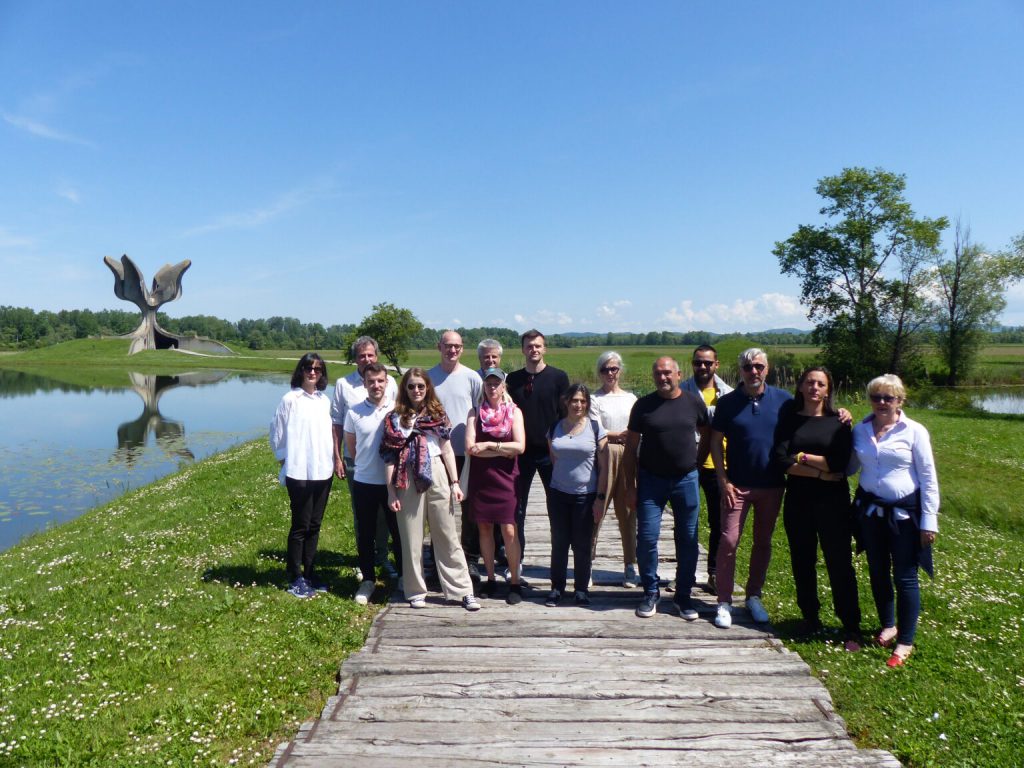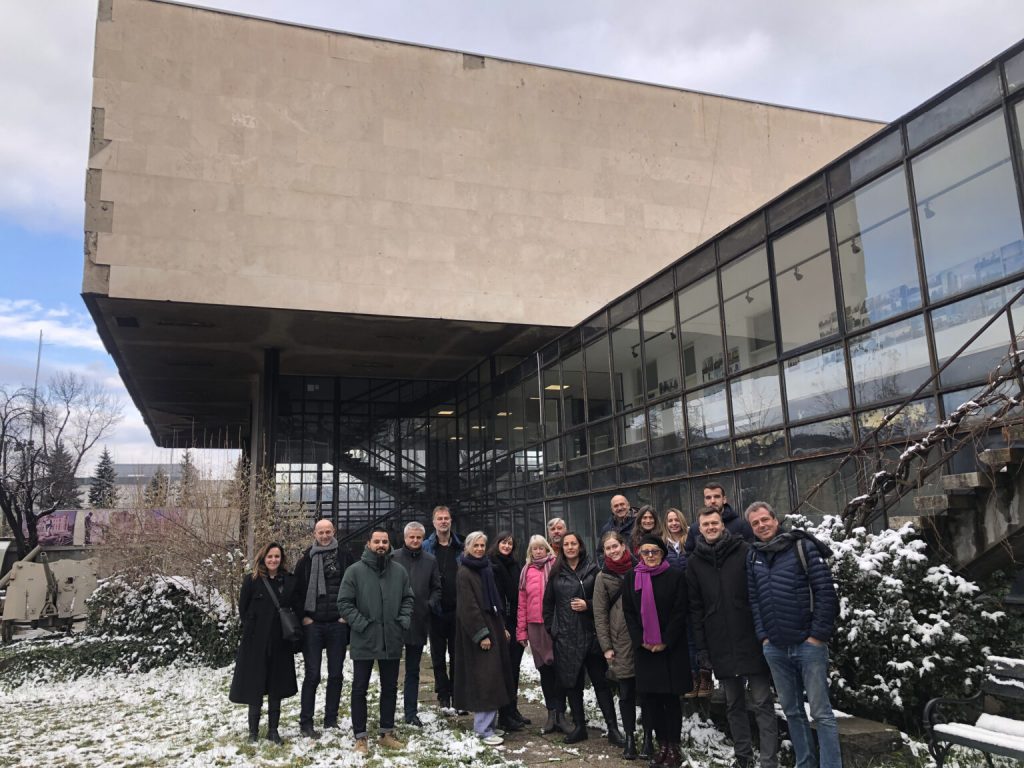The first conference of the project “Wer ist Walter? Resistance against Nazism in Europe” took place in Berlin from 14 to 16 May 2023. It was great to welcome so many researchers and other interested guests for two and a half days of stimulating exchanges and discussions!
We kicked off the conference with a special event: the projection of the movie “Valter brani Sarajevo / Walter defends Sarajevo”, preceded by an introductory lecture “Valter out of memory” by philosopher Boris Buden.
The event sparked a lot of interest and many people came to the cinema hall of Kino Central Berlin, to watch the legendary Yugoslav partisan film from 1972, thanks to the Filmski Centar Sarajevo that provided us with the copy of the film with English subtitles, and to listen to Boris Buden whose critical remarks about European history narratives stimulated a lot of discussions.
The next two days we met at the premises of our cooperation partner Centre Marc Bloch, Berlin’s Franco-German centre for research in social sciences and humanities. Bearing the name of Marc Bloch, who was not only historian but also a member of the French Resistance, the Centre was particularly well suited to hosting the first conference of our project – even more that their conference room is named after another French resistance fighter, Germaine Tillion. After greeting words by Frank Morawietz (crossborder factory), Elma Hasimbegovic (History Museum of BiH) and Jakob Vogel (Centre Marc Bloch), the first session continued with opening reflections by Nicolas Moll comparing 3 figures of the resistance in Europe, Marc Bloch, Germaine Tillion and Vladimir Perić “Valter” under the title “Three histories of resistance in Europe or one common European history?”
The day then continued with 3 thematic panels:
- Panel 1: “Where to resist? Mountains, cities, villages, camps – different spaces of resistance“, with contributions by Yvan Gastaut (University of Côte d’Azur, F), Dino Dupanovic (Museum of the Una-Sana Canton, BiH), Justyna Matkowska (University of Albany, USA) and Markus Roth (Fritz Bauer Institute, D), moderated by Ivo Pejaković (Jasenovac Memorial Site, HR)
- Panel 2: „A secondary role? The place of women in resistance“, with contributions by Juliane Kucharzewski (University of Potsdam, D), Robert Belot (Jean Monet University, F) and Ana Lovreković (Independent researcher, HR), moderated by Dagmar Lieske (Gedenkstätte Deutscher Widerstand, D)
- Panel 3: „A transnational European space of resistance ? Crossborder trajectories of resistance“, with contributions by Vladan Vukliš (Archives of the Republic of Srpska, BiH), Corine Defrance (Centre National de la Recherche Scientifique, F), Alfredo Sasso (University of Florence, I), Susanne Urban (Office on Research and Information on Antisemitism, D) and Jelena Đureinović (University of Vienna, A), moderated by Sanja Horvatinčić (Institute of Art History in Zagreb, HR)
These panels are reflecting some of the chapters of the future edited volume which is one of the planned outputs of our project in summer 2024.
The next day began with the visit of the German Resistance Memorial, both from the permanent exhibition “Resistance against National Socialism”, guided by Tim Lucht, and of the Memorial “Silent Heroes”, guided by Uta Fröhlich. After the visits, we discussed about the exhibitions and then returned to the Centre Marc Bloch for one more thematic panel :
- Panel 4: “The good guys and the bad guys? Grey zones of resistance and collaboration”, with contributions by Xavier Bougarel (Center for Turkish, Ottoman, Balkan and Central Asian Studies, F), Stevan Bozanich (University of Lethbridge, CA) and Marius Hutinet (University of Paris 1 Panthéon Sorbonne, F), moderated by Robert Parzer (Foundation Memorial to the Murdered Jews of Europe, D)
You can find the detailed program with the titles of all presentations of the 4 thematic panels here: https://weristwalter.eu/1st-conference-in-berlin/
Furthermore, in order to connect our project with recent research on resistance against Nazism and fascism during World War Two, we had invited the editors of new collective publications to present those: Ismee Tames talked about the book “Fighters across frontiers. Transnational resistance in Europe, 1938-1948”, co-edited by her and Robert Gildea in 2020, Robert Belot about “Visions of Europe in the Resistance. Figures, Projects, Networks, Ideals”, co-edited by him and Daniela Preda in 2022, and John Paul Newman about “Anti-Axis Resistance in Southeastern Europe, 1940-1944. Forms and Varieties”, co-edited by him, Ljubinka Škodrić, and Rade Ristanović, and which will be published this summer.
To close our conference in Berlin, we organised a public discussion on the topic “Who cares about resistance today? Perspectives from Bosnia and Herzegovina, Croatia, France and Germany”. Elma Hašimbegović (History Museum BiH), Hrvoje Klasić (University of Zagreb), Christine Müller-Botsch (German Resistance Memorial) and Matthias Waechter (CIFE), discussed on the following questions: How did the situation change regarding the remembrance of resistance against Nazism and fascism during World War 2 in our four countries? What role does this memory play today, with what kind of challenges is it confronted? If we think it is important to engage with the history of anti-NS and anti-fascist resistance today, what are ways of doing this?
After the discussion, we invited all guests and participants to a reception, also in the premises of the Centre Marc Bloch Berlin, which was also the opportunity to continue exchanges in an informal way.
We received a lot of positive feedback for our first conference, from the members of our expert team and other panelists as well as from other invited guests. Here some comments:
“The Berlin journey was amazing, really motivating. I came back with many reflections, or ideas for the project.”
“I want to thank the whole project team for organising such an amazing event in Berlin. It was intriguing, inspiring and thought-provoking, and also well-balanced in terms of presentations, discussions and off-program socializing. The visit to the museum was a great moment for the conference, and I very much appreciate the time for the conversation with the curators.”
“It struck me that people were willing to engage beyond their own subject and be interested in various histories and interpretations. Among other things this led, in my view, to the possibility to move beyond a ‘competition’ kind of discussion about which ‘resistance narratives’ should be heard.”
“I really appreciate that I got a chance to participate in discussions about resistance against fascism in Europe. It was really refreshing to hear some new perspectives and insights about the resistance against fascism in Bosnia and Herzegovina and the region. During my primary and highschool education, the history curriculum did not include some topics that were mentioned in the conference, for example “Gray zones of resistance and collaboration”. Furthermore, I appreciate the emphasis on the necessity of discussing and educating about the resistance against fascism in Europe, not only to prevent the obliviation of that significant part of our history, but also to develop a critical opinion about it.”
We would like to thank all partners and participants who contributed to make the conference a very rich and stimulating space of reflection, discussion, exchanges and encounters. We are looking forward to the next steps of “Wer ist Walter?” !
And after the conference in Berlin: What are the next steps? In October, the second conference will take place in Nice, where the thematic focus will be on the transmission of the history of resistance after 1945, especially in museums.
In July 2024 in Sarajevo there will be the third and final conference, where we will present the 3 outputs of our “Who is Walter?” project: the scientific publication with the texts from the conferences in Berlin and Nice, the educational digital platform with 100 stories of resistance, and the exhibition in the History Museum of BiH on resistance in BiH during World War 2, embedded in its European context.
In the meantime, we will also organise several workshops where the project and expert teams will discuss and work together on the development of the publication, the digital platform and the exhibition. The next workshop with our expert team will take place in Nice (France) on 8-9 July, and will also be the occasion to prepare the october-conference in Nice.
Berlin was just the beginning, stay tuned!



